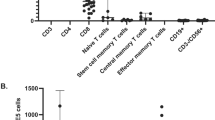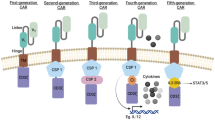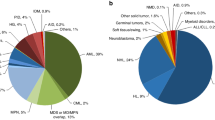Abstract
Recipients of T cell-depleted allogeneic bone marrow transplants have increased risks of relapse and graft rejection. The addition of donor T cells to the TCD allograft will decrease the risk of graft rejection but will increase the risk of graft-versus-host disease (GVHD). Relapse of leukemia or lymphoma following allogeneic bone marrow transplantation can be successfully treated with post-transplant infusions of donor lymphocytes. A relatively small number of donor T cells can have a profound anti-tumor effect and facilitate engraftment, but has an unpredictable potential for severe GVHD. An alternative to using viable immunocompetent donor immune cells to facilitate engraftment and to treat relapsed patients are donor lymphocytes that have been treated to limit their ability to proliferate and cause GVHD. T cells treated with irradiation retain cytotoxic activity against tumor cells and host immune cells. We have tested the hypothesis that allogeneic donor T cells treated with low-dose irradiation will facilitate engraftment and mediate an anti-leukemia effect in a mouse model of bone marrow transplantation. Multiple infusions of irradiated allogeneic donor lymphocytes in the peri-transplant period had graft-enhancing activity without resulting in GVHD. Murine recipients of irradiated allogeneic splenocytes and allogeneic bone marrow had stable donor-derived hematopoiesis without a significant contribution of irradiated donor cells to the T cell compartment. Removing T cells from the allogeneic splenocytes prior to irradiation largely eliminated their graft facilitating activity. Based upon the promising results of the pre-clinical murine studies, we initiated a phase I clinical trial of multiple infusions of irradiated allogeneic lymphocytes in patients who had relapsed after allogeneic BMT. Of 12 patients treated to date on this study, three have shown objective responses of their leukemia or lymphoma to multiple infusions of irradiated donor lymphocytes. We have initiated a new phase I clinical study to test the efficacy of multiple infusions of irradiated allogeneic cytotoxic T cells to facilitate engraftment in allogeneic transplantation. Successive cohorts of patients will be transplanted with allogeneic stem cells alone, or a combination of allogeneic stem cells and increasing numbers of irradiated allogeneic T cells. Irradiated allogeneic lymphocytes that retain short-term allo-specific cytotoxicity and lack the potential for clonal expansion in vivo can be considered as a novel form of immunotherapy with defined pharmacokinetics. Bone Marrow Transplantation (2000) 25 , Suppl. 2, S20–S24.
Similar content being viewed by others
Author information
Authors and Affiliations
Rights and permissions
About this article
Cite this article
Waller, E., Boyer, M. New strategies in allogeneic stem cell transplantation: immunotherapy using irradiated allogeneic T cells. Bone Marrow Transplant 25 (Suppl 2), S20–S24 (2000). https://doi.org/10.1038/sj.bmt.1702347
Published:
Issue Date:
DOI: https://doi.org/10.1038/sj.bmt.1702347
- Springer Nature Limited
Keywords
This article is cited by
-
Apoptotic signaling through Fas and TNF receptors ameliorates GVHD in mobilized peripheral blood grafts
Bone Marrow Transplantation (2014)
-
Human AdV-specific T cells: persisting in vitro functionality despite lethal irradiation
Bone Marrow Transplantation (2014)
-
Experimental and clinical approaches for optimization of the graft-versus-leukemia effect
Nature Clinical Practice Oncology (2007)
-
‘GVHD’: graft-versus-host disease or graft-versus-Hodgkin's disease? an old acronym with new meaning
Bone Marrow Transplantation (2003)
-
Donor leukocyte infusions in acute myelogenous leukemia
Leukemia (2003)




